

Zoe Krasney: Your book on elephants (Elephants on the Edge: What Elephants Teach us about Humanity, 2010) has had great success. I hear about your work everywhere. 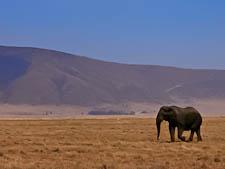
Gay Bradshaw: Thank you. I’m happy that the book is done, and it’s great to feel that you’re part of a change. But on a negative note, the plight of elephants has not improved; in fact, it’s getting worse.
ZK: It’s difficult to get information about the things you’ve discussed in your book.
GB: The idea of an animal psyche, a mind and consciousness that is at least comparable to those of humans, is a new idea. But it is not for lack of data, and access to information is not a problem. There is an incredible amount of information about elephants. My book is only the tip of the iceberg in terms of the data, insights and resources that we now have. Yet with all this knowledge, elephant are headed toward extinction in a couple of decades. Extirpations – local extinctions – are occurring all over Asia and Africa; in Vietnam for example, I heard that there were only two hundred elephants left. This is remarkable when you realize that both continents were once completely occupied by elephants. Further, while elephants have been hunted and driven from their habitat since European colonization, there a veritable genocide taking place over the last couple of decades because of increased ivory poaching, trophy hunting, and culls. Subsequently, it’s denial that nonhuman animals are “as good as us” and it is the lack of political willpower to act on what we know that is driving elephants and other wildlife to extinction. The message continues that animals get in our way. No matter what research reveals, we still use them to fuel our needs in human society.
ZK: You give so many sad and horrific stories about elephant abuse and trauma due to the things you just mentioned – war, starvation, poaching, habitat loss and captivity. You use the comparison of people who have suffered in the Holocaust, under apartheid and during slavery. Could you explain why you use these analogies as comparisons?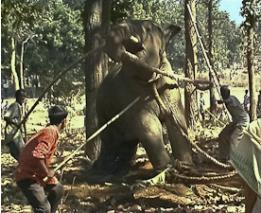
ZK: I was particularly affected by your discussion of animal forgiveness in your book. I was thinking of how meaningful it is in the context of memory, trauma and loss, which are the very things we say make the human experience of forgiveness so powerful. Could you explain your trans-species psychology, why you founded The Kerulos Center and, as the subtitle of your book suggests, what do animals teach us about humanity?
GB: I founded the field of trans-species psychology because I was interested in the unity and commonality of minds and emotions across species. I wanted to bring science’s understanding that all animals – human and nonhuman – share common emotions and thought processes and are equally vulnerable to psychological suffering. What we and other animals experience can be described by a single model of brain, mind and behavior. Trans makes the point that suffering and psychological experience are not bound to humans alone but are shared with all species. The word trans moves us away from the dichotomous human-animal paradigm. Science clearly shows that animals have attributes that were once thought to be uniquely human, such as emotions, consciousness and a sense of self. Of course, a lot of people react by saying, ‘Oh well, this is just anthropomorphism!” Anthropomorphism, however, no longer exists in the trans-species framework because it is reduced to simple projection. We have projections with each other. If I perceive things to be that are not congruent with how you are, it’s simply projection. I can do it with you, with a dog, with a parrot or elephant or whatever. It’s the same kind of process and requires exercising the same kind of ethics we are compelled to follow whether dealing with another species or another human being.
Trans-species science gives “permission” to look beyond difference. We can look at other animal societies as other cultures. We can look at their values, their relationships, their customs, and compare them with ours. What we learn when we really see into elephant experience, beyond our prejudices and obsession to objectify, we see how much we share with elephants and other animals. And in so doing, really see who we humans have become: violent and bent on genocide of wildlife. It used to be that when someone said, “being like an animal,” it meant being violent, aggressive and primitive – that we’re just a bundle of instincts, with no high-order faculties. Science shows that’s no longer valid. When you really look at animal cultures, we see something completely different. No other animal species that we have known has ever done what we have done to them. Animals are quite specific in their reactions to each other. Violence is used very parsimoniously in the animal world. Lions kill infrequently and they do so to eat. Interestingly enough, there is a whole new theory coming out of anthropology, neuropsychology and other fields, arguing that the within species violence observed in the Gombe chimpanzees who Jane Goodall and others studied was in response to human environmental manipulation. In essence, human culture spread to chimpanzee culture.
Unlike many humans, animals show a tremendous capacity to forgive. Elephants who have been separated from their families and had their families slaughtered still show an incredible capacity for acceptance and generosity of the heart. In contrast to modern human society fraught with violence and conflict, wildlife societies are prosocial, empathetic, cooperative, and psychologically healthy. This is what we can learn from other animals: The question is, are we able to cultivate being like an elephant? Can we change human culture so that it emulates elephant society? Can we go beyond our species lines to reconcile? 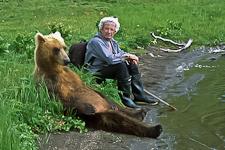
GB: What I am really urging people to do is to move away from a paradigm of difference. Everything in our modern society is based on trying to show who is different from whom. This is unhealthy. Why do we keep persisting in this? The big news is not that animals use tools and symbolic language, or that they have culture, self-awareness and consciousness like we do. That is not so interesting. The news is why are we humans doing what we do? Why do we persist in being so violent toward animals? Why do we insist animals are “less” when in fact science shows otherwise? Scientists and researchers are guilty of this as well. Research for new information is just like a researcher purporting to help elephants and other animals and continues to collect data, but for what purpose? Research and science have become insulated self-serving cultures. We don’t need new information. We need to act on what we know. What we need to know is already in our hearts as well as in millions of journals and books. We in the West and modern human societies have got to stop our particular economic and social agenda that is causing so much suffering in the world. But most people don’t want to hear that, or more precisely, do that. That’s the wall we’re coming up against. Business is not working as usual, literally and metaphorically, and that’s indicative of a paradigm shift. The challenge is: How do we deconstruct thought processes, the institutions that cause trauma, violence, alienation and suffering? How do we deconstruct them as quickly as possible with the least harm? It’s very difficult. Radical change is needed and, hopefully, radical peaceful change will come soon. 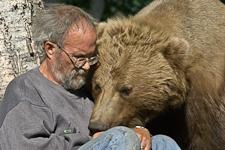
ZK: Can you imagine a world whereby we live by the principles of trans-species culture? How would it be different from the one we live in now?
GB: At a first approximation, I think it looks very much like subsistence cultures, tribal cultures such as the aboriginals, the Andaman Islanders, people who are still living subsistence lives. I believe we need to become a plant based culture, eat only plants. There’s still a few [subsistence cultures] left existing in the world, but they are under siege and are being killed and driven out of their homelands. They are no longer able to live authentically with nature. From my perspective, we would model how to get back to subsistence living, getting away from and ridding ourselves of large-scale agriculture. Robert Lawlor writes about his in his beautiful book, Voices of the First Day. Progress is really about returning to the past. People say that’s ridiculous and that’s never going to happen. But our culture has somehow taken a wrong trajectory and we need to look at how we, as a society and as individuals, can take steps back in a peaceful way. Peaceful means how we stop killing animals, how we stop harming their habitats and breaking the ways this is so culturally ingrained.
ZK: Can you talk about captivity? Zoos, for example? Parents bring their kids to zoos. I did with my son, mainly to give him an opportunity to care about animals and things outside of his world. Are there good zoos? Is this something we need to rethink?
GB: Captivity is institutionalized trauma. Zoos, aquaria, and other places like circuses are exploitative. They are businesses. Visiting zoos is no different from visiting prisons. These places are filled with animals suffering horribly, surviving by living in disturbing mental states and behaviors such as self-mutilation, depression, unhappiness, premature death, elephants living half as long as their free ranging counterparts, mothers killing their babies, aggression and fighting. Would you bring your child to a concentration camp or to a prison? The comparison is no exaggeration. 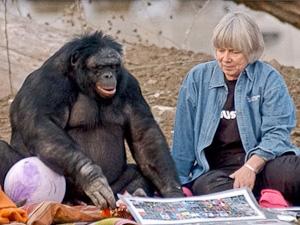
GB: Such trans-species language is a logical extension of trans-species science. Most of the language and terminology we use is reflective of the dichotomous way we think: mind/body, science/spirit, up/down, human/ animal. We need a language that reflects holism and does not exclude or discriminate against nonhuman species Language has to be meaningful and describe concepts and perceptions within a paradigm. If we cultivate trans-species culture, then we recreate cross-species meaning. Only when humans see and know animals as meaningful as they do themselves will wildlife be able to survive and live in peace again.
ZK: You have used the word spiritual only once in our conversation, but I feel that you are reestablishing a connection with what we hunger for, i.e., a deep connection to the natural world.
GB: I don’t use spiritual very often. Not because it’s not important but because it’s a personal experience. However, at the Kerulos Center, where we try to provide people with diverse ways to create meaning in a trans-species social setting, spirituality is extremely important. It is very much part of the work we do. On our website, we say that the work we do is through science, spirit and service. This transformative work is exceptionally important to us. We encourage and develop concepts and practices that move us from separation into a space of cross-species relationship and culture. By acting from a place of connection, we can cultivate peace. By serving other species we serve our own species as well.
ZK: And does it inspire a sense of responsibility?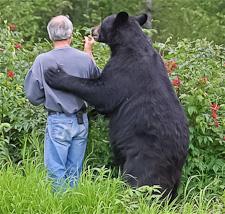
ZK: What implications does the loss of biodiversity have for our planet?
GB: Well, I don’t like the term biodiversity because it’s an objectification. We are not just losing “things." We are losing souls, not just “diversity.” I prefer to think of “biodiversity loss” as animal genocides. A tiger pacing in the zoo, parrots in cages that are self-mutilating until they die or an elephant being poisoned in India – what we are seeing is a mirror to ourselves and the suffering we feel ourselves, whether consciously or unconsciously. Let’s make wherever we are living right now a wild garden. Rather than travel abroad to somewhere else, create a wild garden right here, where you are for the animals. The grizzly is no different than the elephant. The cougar is no different than the elephant. The tiger is no different than the elephant. It’s not diversity. We are a family, and we are killing the members of our family. What is needed is radical change, and it is needed now.
To learn more about what you can do, please visit The Kerulos Center.
Images are copyright protected and may not be reproduced without permission. Copyright information for the photos are as follows: 1) Plains Elephant, photo used with the permission of Flickr Creative Commons Attribution License 2.0 Generic, courtesy of Doug Weller; 2) Elephant Torture, photo courtesy of Saparna Ganguly; 3) Talking About Trust, photo courtesy of Charlie Russell; 4) Cookie, photo courtesy of C&C Images; 5) Trans-Species Knowledge, photo courtesy of Sue Savage-Rumbaugh and the Great Ape Trust; 6) Cinnamon, photo courtesy of C&C Images.